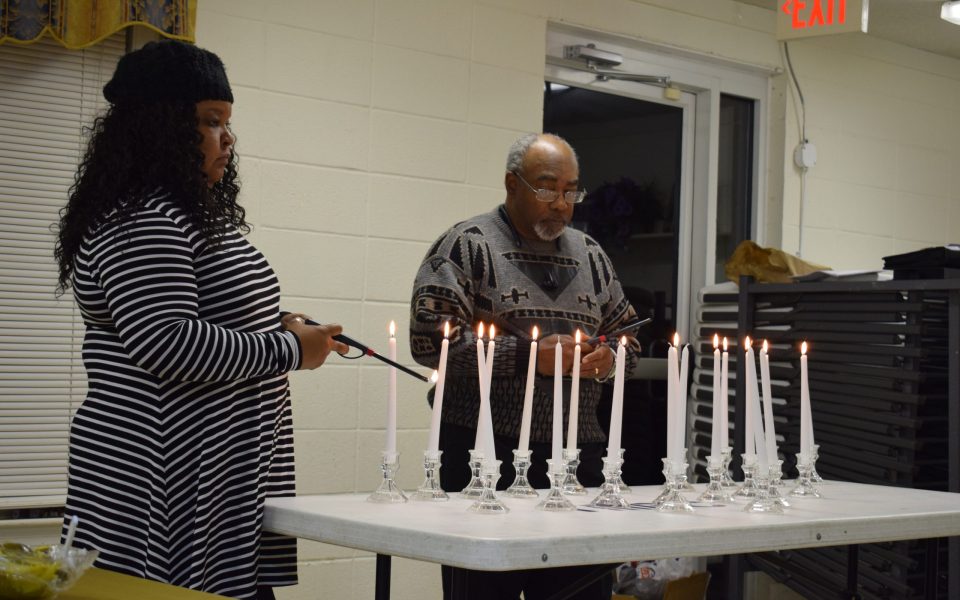The High Point NAACP held its last community meeting of the year on Thursday evening to memorialize 2017’s homicide victims and called on themselves and fellow community members to combat mounting violence with a renewed sense of urgency and creativity in 2018.
Roughly two dozen people — overwhelmingly middle-aged and elderly black men — convened at Temple Memorial Baptist Church, including an assortment of clergymen and city council members Jeff Golden, Don Scarborough and Chris Williams.
In response to the homicide epidemic, the High Point NAACP began holding monthly meetings at various churches around the city earlier this year with the intention of resolving the problem of violence by cultivating discussion between community members and police. As 2017 comes to a close, 20 homicides are on record in High Point, almost triple the numbers in 2015 and 2016.
“We have to work together to give our support to High Point Police Department, to other entities within our community because it’s a challenge that we all have to answer,” Pastor Brad Lilley, community coordinator for the NAACP, said. “We can’t sit back and say, ‘They’re gonna do it,’ because it’s not going to get done.”
Chief Kenneth Shultz — who has largely avoided the NAACP-sponsored community meetings — and Assistant Chief Travis Stroud attended Thursday’s meeting. Shultz added another name to this year’s list: 16-year-old Na’kayla Bynes, murdered the evening of Dec. 24. Though several of 2017’s cases remain unresolved, police arrested Bynes’ alleged killer.
Lilley appealed to Shultz, requesting guidance on how leaders can engage the issue of community violence in ways the police cannot. Shultz said his evaluation is that most of the violence is retaliatory in nature and suggested that the community can step in with “love…and come up with a higher power than the police chief to alter some of these individuals’ lives and get them pointed in the right direction.”
Shultz reported that his department is focused on young men they understand to be driving most of the violence, though, and indicated the success of call-ins during which police department officials confront young men most at-risk for committing violence or otherwise illegal acts in front of family members and others in the community in a formal setting like City Hall.
“They’re told two things,” Shultz said. “One, that if you need support from the community, we’ve got the organizations that are put together [and] that we can do everything possible to help keep them on the right path. The other, though, is that… if they do something wrong we’re gonna come after them and keep our community safe.”
Rather than discuss solutions to systemic drivers of community violence, the meeting’s participants focused on cultural issues like a perceived dearth of personal responsibility among young men and boys.
Henry “Hank” Wall, founder and executive director of Brothers Organized to Serve Others (BOTSO), is known for this approach. His nonprofit has a 25-year track record of mentoring young men and boys with a mission to teach personal responsibility, respect and character. Wall’s son and BOTSO’s lead mentor Chi Wall suggested that adult men go to at-risk boys and young men in a similar fashion to police call-ins.
Jimmy Scott contended that a one-way, top-down approach isn’t enough to foster meaningful change in young people’s lives.
“We tend to do a lot of the talking instead of listening,” Scott said. “We need to hear their points of view. If we want to change their behavior, we gotta try to understand what’s causing that behavior. We can’t do that by just telling them what we think.”
Several men aired frustration about attempts to collaborate with local schools, but Mayor Pro Tem Chris Williams encouraged leaders to continue with their endeavors given that schools offer a captive audience and that older students, in particular, can talk to age-peers who are no longer in school.
Shultz agreed that mentorship in schools can be highly effective but many participants pointed to the success of summer programs such as one New Bethel Baptist Church developed last year to provide a safe place for boys and facilitate educational field trips. The program also brought in retired teachers to expose boys to information they might not pick up in school. Williams also commended the High Point Housing Authority’s similar Summer Success program and advised that both are excellent models for those discerning next steps.
“When 2018 comes around, the count starts all over, but it’s not a new beginning — it’s a continuation unless we put the brakes on, unless we stop it,” Lilley said. “Every time we pick up a newspaper or turn on the news, every time we hear of a shooting or a killing, most of us probably say the same thing I say: ‘Not another one.’ I would like to end this year out saying, ‘Not another one to have to lose their life.’”
Join the First Amendment Society, a membership that goes directly to funding TCB‘s newsroom.
We believe that reporting can save the world.
The TCB First Amendment Society recognizes the vital role of a free, unfettered press with a bundling of local experiences designed to build community, and unique engagements with our newsroom that will help you understand, and shape, local journalism’s critical role in uplifting the people in our cities.
All revenue goes directly into the newsroom as reporters’ salaries and freelance commissions.


Maybe the Greensboro Police Department can lend a hand the next time they come out to Catawba County; they have a homicide problem, too, but Chief Scott’s insiders are into bigger and better scandals and victim’s families should know that.